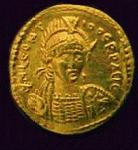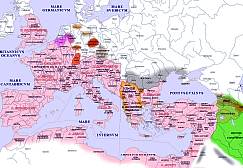

An Online Encyclopedia of Roman Emperors
Leontius (AD 484-488)
Hugh Elton
Florida International University

Leontius was probably an Isaurian, though origins in Syria and Thrace also appear in the sources. He had a military career. He is first heard of in 484, when Zeno sent him against the rebellious Illus. Illus persuaded Leontius to desert Zeno and then declared Leontius Augustus on 19 July, 484 at Tarsus. He had the support of Zeno's mother-in-law, Verina, who issued a Chalcedonian proclamation. Antioch was occupied for 12 days (27 July - 8 August), during which time a few coins were hurriedly minted. At this point a second imperial expedition arrived, under Ioannes the Scythian. These troops rapidly defeated Illus and Leontius at Antioch in Syria. The rebels were then besieged at Papirius in Isauria, a siege which lasted for four years. In 488 the fortress was betrayed. Leontius was executed at Seleucia-on-Calycadnus and his head was taken to Constantinople, where it was impaled on the walls.
Bibliography
For references to primary sources, see entries in RE or the PRLE. Translations of much of the source material can be found here in Ralph Mathisen's DIR essays on the "Shadow Emperors", or in C.D. Gordon ( The Age of Attila: Fifth-Century Byzantium and the Barbarians [Ann Arbor, 1960]) and R.C. Blockley (Fragmentary Classicizing Historians of the Later Roman Empire [Liverpool, 1983], vol. 2.).
Brooks, E.W., "The Emperor Zenon and the Isaurians", EHR 8 (1893): 209-238
Kent, J.P.C., Roman Imperial Coinage volume 10 (London, 1994), 122.
Prosopography of the Later Roman Empire, vol. 2, ed. J.R. Martindale (Cambridge, 1980)
RE Supp. 8 (1956), 939-841
Salomon, M., "Acclamation or barbarism in the legend of Leontius' (484-488) solidus", Wiadomósci Numismaticzne (1990): 154-159.
Copyright (C) 1998, Hugh Elton. This file may be copied on the condition that the entire contents, including the header and this copyright notice, remain intact.
Comments to: Hugh Elton.
Updated:10 June 1998
For more detailed geographical information, please use the DIR/ORBAntique and Medieval Atlas below. Click on the appropriate part of the map below to access large area maps.
